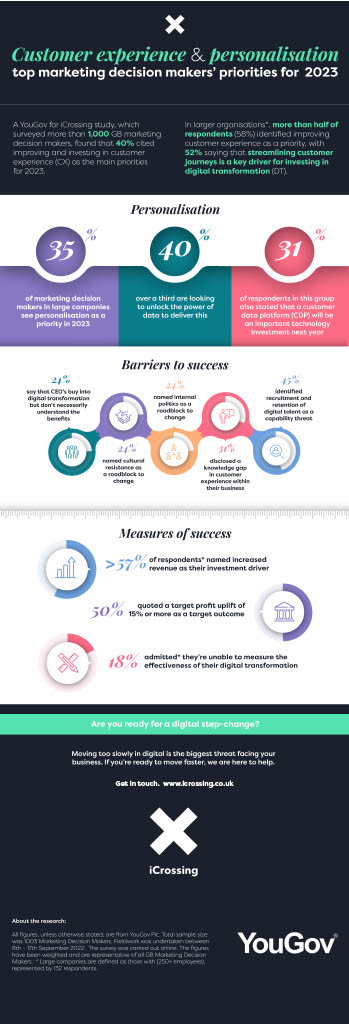Improving and investing in customer experience (CX) will be the main priority for over a third (40%) of all UK marketing decision makers in 2023, according to research from digital agency iCrossing.
The study, conducted by YouGov for iCrossing, explores the attitudes and intentions of more than 1000 UK marketing decision makers towards digital transformation (DT) projects in 2023, and reveals that while a large proportion recognise the importance of investing in digital transformation as a key driver for business success, they are facing a number of barriers to achieving their goals.
In larger organisations specifically*, more than half of respondents (58%) identified improving customer experience as a priority for their organisations in 2023, while 52% of this cohort also stated that a streamlined customer journey is a key driver for investing in digital transformation.
The research also revealed that more than a third (35%) of marketing decision makers surveyed in large companies see personalisation as a priority in 2023. These respondents recognise the importance of access to customer data in delivering this, with 40% looking to unlock the power of data as a priority next year. Perhaps unsurprisingly then 31% of respondents in large companies also stated that a Customer Data Platform (CDP) will be an important technology investment for 2023.
Roger Barr, Chief Digital Officer at iCrossing UK, commented: “It is perhaps unsurprising that investment in customer experience and personalisation is a key priority for marketing decision makers in 2023. Marketers recognise the importance of building and retaining strong customer relationships, and this is more important than ever as we head into a challenging financial period for consumers.”
Measures of success
Marketing decision makers seem clear on the key drivers for investing in digital transformation projects and expect high returns from any investment. More than half (57%) of respondents from large companies cited increased revenue, and 50% quoted a profit uplift of 15% or more, as successful outcomes. Nearly half (45%) also cited reducing operating costs as an additional driver for investment in digital transformation projects. However, 18% of those surveyed from large organisations feel they are unable to measure the effectiveness of their digital transformation.
Roger Barr said: “The fact that almost a fifth of all respondents feel they are unable to measure the effectiveness of digital transformation is a concern. It is crucial to measure the success of your investments and the key to this is understanding your data effectively, knowing what to measure and where, and the key to this is the appropriate CDP technology.”
When it comes to achieving success in digital transformation projects, however, the research revealed that marketing decision makers face multiple barriers, with challenges such as internal silos, company politics, and attracting talent all cited as a barrier to success.
Of those surveyed, 24% say their CEO’s buy into digital transformation but don’t necessarily understand the benefits. Of those working in large business, almost a quarter (24%) also named cultural resistance and internal politics (24%) as a further barrier to digital transformation success.
Attracting and retaining digital talent also remains a threat to large businesses achieving their digital transformation ambitions. Almost a third (31%) of respondents stated that they have a knowledge gap in their CX, and while hiring the right people is essential to achieving success, nearly half of respondents (45%) also named recruitment and retention of digital talent as a threat to their digital capability.
Roger Barr added: “With such a high percentage of businesses seeing DT and CX as a priority, then the fact that many CEOs don’t understand the benefit or have the willingness to invest is shocking and suggests marketers’ chances of success are slim. When set against a backdrop of skills gaps, lack of investment, but also very high and perhaps sometimes unrealistic expectations, it’s a lot to ask of digital transformation. Outstanding leadership, people who can demonstrate and speak about the benefits to the business and make a compelling case for sustained investment will be key for marketers to deliver successful digital transformation in 2023.”
* Large companies are defined as those with (250+ employees), represented by 132 respondents.










